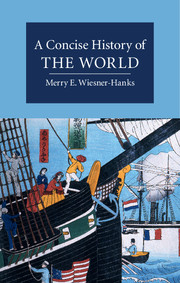Book contents
- Frontmatter
- Contents
- List of figures
- List of maps
- Introduction
- 1 Foraging and farming families (to 3000 BCE)
- 2 Cities and classical societies (3000 BCE–500 CE)
- 3 Expanding networks of interaction, 500 CE–1500 CE
- 4 A new world of connections, 1500 CE–1800 CE
- 5 Industrialization, imperialism, and inequality, 1800 CE–2015 CE
- Index
5 - Industrialization, imperialism, and inequality, 1800 CE–2015 CE
Published online by Cambridge University Press: 05 October 2015
- Frontmatter
- Contents
- List of figures
- List of maps
- Introduction
- 1 Foraging and farming families (to 3000 BCE)
- 2 Cities and classical societies (3000 BCE–500 CE)
- 3 Expanding networks of interaction, 500 CE–1500 CE
- 4 A new world of connections, 1500 CE–1800 CE
- 5 Industrialization, imperialism, and inequality, 1800 CE–2015 CE
- Index
Summary
Writing from prisons in British India where he was imprisoned for political activity in the early 1930s, the Indian independence leader Jawaharlal Nehru (1889–1964) sent a series of nearly two hundred long letters to his teenage daughter Indira, in which he provided her with a sweeping view of world history. Gathered together in 1934 with the title Glimpses of World History, the letters range from the rise of the first cities to Nehru's own day. About a third of the way through the book is a letter titled “The Coming of the Big Machine,” in which Nehru comments that, more than anything else he has written about, industrialization “changed the face of life … It was a revolution affecting all the various classes, and indeed everybody. It has made the difference between the luxury of the very rich and the poverty of the poor even greater than it was in the past.” These effects were felt around the world, Nehru comments, for “capitalist industry led inevitably to a new imperialism, for everywhere there was a demand for raw materials for manufacture and markets for new manufactured goods … So there was a wild scramble among the more powerful countries for new territories … [and then] a new kind of empire, invisible and economic, that exploits and dominates without any obvious outward signs.”
Nearly a century later, world historians generally agree with Nehru that industrialization created the modern world, not only that of his day, but our own as well. The use of fossil fuels—first coal and then also oil and gas—allowed a dramatic increase in productivity, as the energy stored over hundreds of millions of years was taken out of the ground and put to human use. Industry transformed the world politically, economically, socially, and physically, and allowed the nations that industrialized to dominate those that did not in a new wave of imperialism through military conquest that began in the nineteenth century. The invisible, economic empire that Nehru alluded to, often called neocolonialism or soft imperialism, also expanded throughout the world. In this new form of empire, multinational corporations and international agencies were often more important than states, shaping society and culture as well as the economy. Together industry and imperialism (both hard and soft) facilitated greater inequality, both within one nation or region and among them.
- Type
- Chapter
- Information
- A Concise History of the World , pp. 286 - 376Publisher: Cambridge University PressPrint publication year: 2015

